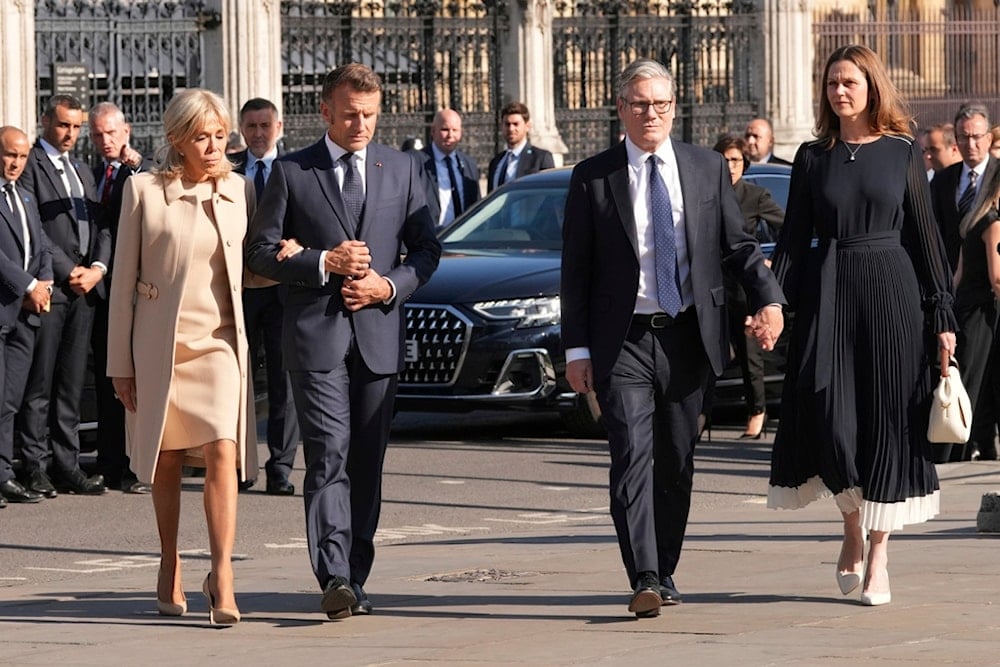Macron calls on UK to recognize Palestine during State visit
During a state visit to the UK, French President Emmanuel Macron urged Britain to recognize the State of Palestine, amid criticism that Western powers are using Palestinian statehood as a diplomatic tool rather than a genuine commitment.
-

Britain's Prime Minister Keir Starmer and his wife Victoria Starmer, right, alongside France's President Emmanuel Macron, second left, and his wife Brigitte Macron, arrive to attend a ceremony at the statue of wartime Prime Minister Winston Churchill, in Parliament Square, London, on July 8, 2025. (Carlos Jasso/Pool Photo via AP)
French President Emmanuel Macron used his address to the British Parliament to urge the UK to recognize the State of Palestine, Bloomberg reported on Tuesday.
The intervention comes as Western powers attempt to regain influence in the Middle East, amid growing anger over their complicity in "Israel's" ongoing assault on Gaza and their historical failure to uphold Palestinian rights.
"Today, working together in order to recognize the state of Palestine and to initiate this political momentum is the only path to peace," Macron told British lawmakers during the first state visit by a French president to the UK in over 15 years.
His remarks coincide with mounting calls across Europe to acknowledge the legitimacy of Palestinian statehood, especially in the wake of "Israel's" devastating military campaign.
Independent Palestinian state is ‘the ONLY path to peace’
— RT (@RT_com) July 8, 2025
Macron calls for a ceasefire ‘without any conditions’ and a two-state solution
The same Macron who backed Israel's attacks on Iran pic.twitter.com/4dxaCbGGZL
While Macron's statement signals a shift in rhetoric, critics note that France, like the UK, has yet to take meaningful action. Recognition of Palestine remains suspended in diplomatic limbo, often invoked but rarely implemented.
Though both countries have held talks on the matter, London has refused to commit, and Macron's appeal comes as part of wider efforts to revive regional diplomacy, efforts many view as leveraging Palestine's status as a bargaining chip to secure Gulf cooperation.
Symbolic diplomacy
Macron's visit, the first by a European leader since Brexit, was steeped in symbolic overtures. He praised the "friendship" between Paris and London, referred to Prime Minister Keir Starmer as "dear Keir," and lamented Brexit as "deeply regrettable." He was received with ceremony by the British royal family and announced that France would loan the Bayeux Tapestry to the UK.
Addressing broader geopolitical concerns, Macron warned of Europe's vulnerability to foreign digital dominance, stating that "US and Chinese algorithms make Europe vulnerable." He also reaffirmed support for Ukraine and called for joint efforts to curb illegal migration.
Without naming names, he warned Europe was facing "hesitating alliances," a likely reference to the shifting stance of the US under Donald Trump.
Recognition without liberation
Within the UK, Starmer continues to face backlash from Labour's base over his support for "Israel" following the October 7 events. In recent months, he has attempted to distance himself from "Israel's" far-right government, imposing limited sanctions. Still, critics accuse him of failing to stand up for Palestinian lives or call for a permanent ceasefire.
Foreign Secretary David Lammy echoed this stance, conveying to the Foreign Affairs Committee: "Alongside French and Saudi colleagues, we are discussing recognition, but my indication and my instinct is, I actually want things to change the situation on the ground."
Read more: Let France create Palestinian State in French Riviera: Huckabee
France, meanwhile, had planned to co-host a summit with Saudi Arabia to push forward a roadmap for Palestinian statehood. That meeting was postponed after "Israel's" aggression on Iran.
The proposed roadmap reportedly includes new "security guarantees" for "Israel", once again placing its military comfort above Palestinian liberation. On that note, Lammy stated that the summit could be rescheduled for later in July or September, if a ceasefire is reached.

 3 Min Read
3 Min Read










